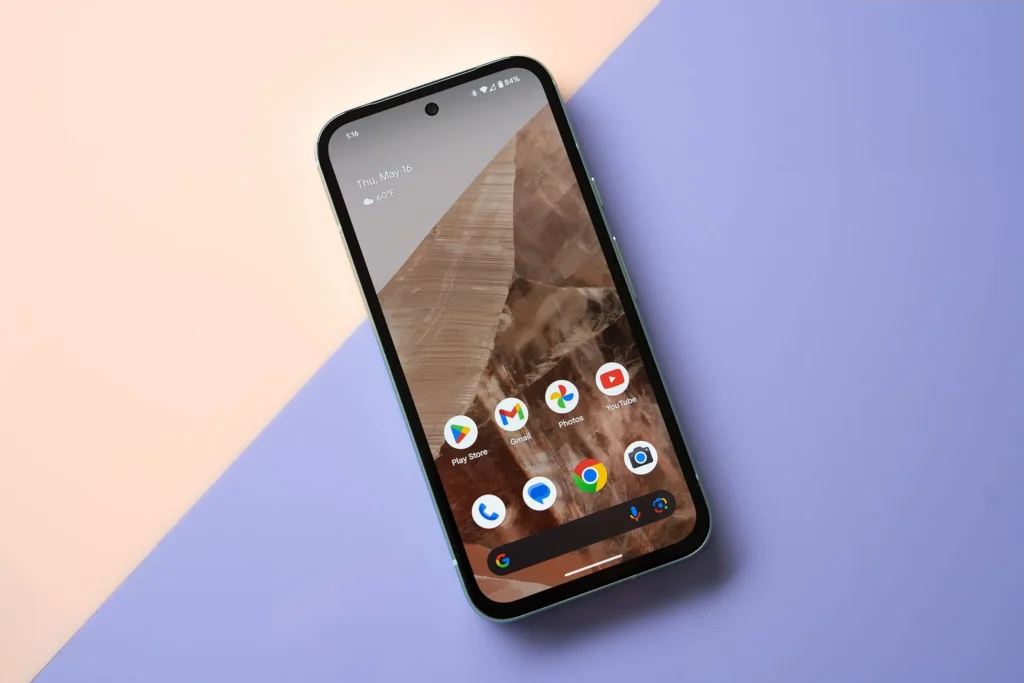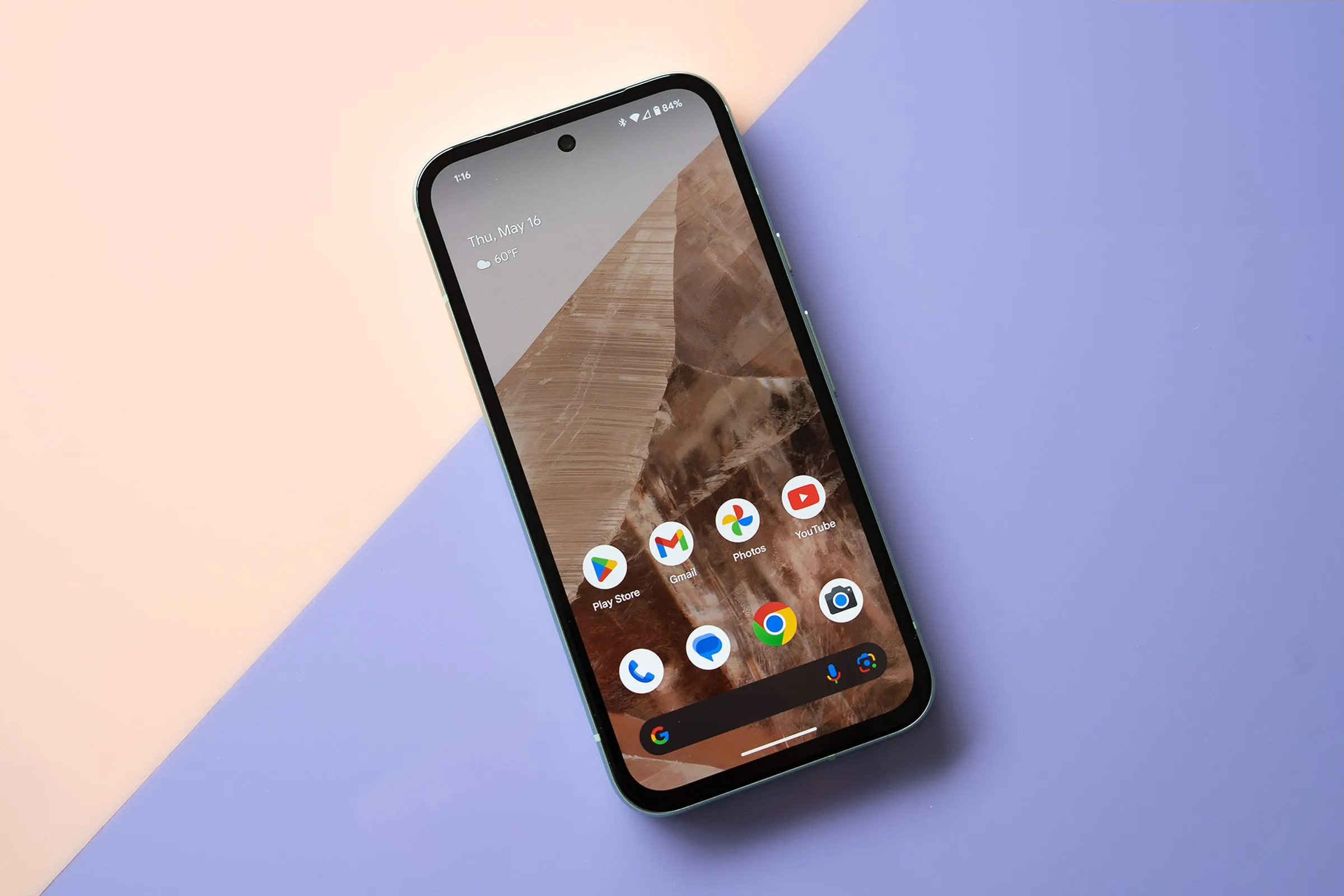The Pixel 8A may lack the fancy extras like a telephoto lens or top-tier water resistance, and it definitely doesn’t fold in half. However, it boasts two key advantages: time and affordability.
Arriving six months post the Pixel 8 and 8 Pro, this timing plays in its favor. This period allows for early bugs to be ironed out on the new operating system and resolves issues such as the availability of on-device AI across all Pixel models, including the Pixel 8A.
Speaking of savings, the Pixel 8A comes in at just $499 in a market dominated by $1,000 flagships. Considering it offers almost all the core features of the pricier $799 Pixel 8, it starts looking like an even better deal. Plus, with a promise of seven years’ worth of software updates, the return on investment is hard to ignore.
Built with a robust aluminum frame, Gorilla Glass 3 on the front, and a plastic back with a sleek matte finish, the Pixel 8A exudes quality. The new aloe color option is especially impressive. With an IP67 rating, it’s dustproof and can handle a quick dip in water, setting it apart from other models in its class.
During my recent hectic travel days with the Pixel 8A, I never once fretted about the battery. Despite indulging in more social media scrolling than usual, along with using navigation and Uber rides, the battery still held up admirably till the day’s end. Just like its predecessor, the 8A supports Qi wireless charging. I enjoy the convenience of placing my phone on a charging stand at night, a luxury not common among most budget phones.
This year’s screen upgrade boasts a top refresh rate of 120Hz, aligning with the Pixel 8 and 8 Pro. The fluidity of motion on the screen, such as scrolling and animations, is noticeably smoother compared to a standard 60Hz or even the 90Hz screen on the 7A, making it a substantial upgrade. Sporting a 6.1-inch 1080p OLED display, it may not be the absolute best in its class — that title belongs to the OnePlus 12R. Nonetheless, the 8A’s screen is undeniably satisfactory in the age of high refresh rate displays.
Google Pixel 8A specifications
- Processor: Tensor G3
- Storage and RAM: 8GB of RAM, 128GB or 256GB of storage
- Weather resistance: IP67
- Screen: 6.1-inch 1080p 120Hz OLED
- Camera: 64-megapixel f/1.9 main with OIS + 13-megapixel f/2.2 ultrawide + 13-megapixel selfie
- Battery: 4,492mAh cell / up to 18W wired charging / 7.5W wireless
- Software: Ships with Android 14. Seven OS upgrade and seven years of security updates promised
The Pixel 8A is powered by Google’s Tensor G3 chipset, also found in the Pixel 8 and 8 Pro, matched with 8GB of RAM—equivalent to the Pixel 8. This setup supports Gemini Nano, Google’s mobile-optimized AI model, for on-device use, requiring activation as a developer preview feature. Initially reserved for the Pixel 8 Pro, Google later expanded this functionality.
Currently, Gemini Nano allows select on-device AI capabilities, eliminating the need for an internet connection while safeguarding your data privacy. Features include generating summaries for recordings and using Magic Compose in Messages to adjust your writing style. Although the current features may not be groundbreaking, Google promises to enhance on-device capabilities with Gemini Nano in the near future, such as a scam call alert function.
Having on-device AI is advantageous, positioning the Pixel 8A as one of the most affordable smartphones with this capability. In the interim, the Pixel 8A managed all my daily tasks seamlessly.

The 8A is ready for on-device AI.
I’m delighted to note that the Pixel 8A introduces a significant quality-of-life enhancement from the Pixel 8 and 8 Pro: the inclusion of facial unlock for mobile payments and password managers. While facial unlocking was available on previous Pixel models, using it for payments required an additional fingerprint verification step.
Though it may seem like a minor detail, this update greatly enhances the user experience. It eliminates the need to readjust your grip or put down items to access your password manager; it seamlessly occurs, simplifying the process.
In day-to-day usage, distinguishing the Pixel 8A from the 8 or 8 Pro may prove challenging, except when using the camera application. The device features two rear cameras inherited from the Pixel 7A that perform admirably for a budget-friendly phone.
The primary 64-megapixel camera incorporates optical image stabilization for sharp low-light images, accompanied by a proficient 13-megapixel ultrawide lens. While functionalities like video portrait and macro modes are absent, as well as a dedicated telephoto lens, these are typically scarce in budget devices.
Pixel 8A night mode (left) versus Pixel 8 Pro (right).
The budget-friendly Pixel 8 Pro impresses with its night mode photos during a rare aurora borealis sighting over Seattle. The 8A also shines with its strong night and portrait modes. Both models boast Pixel phone’s signature photo processing features, including the invaluable face unblur for toddler snapshots.
New features like Magic Editor and Best Take introduce exciting possibilities for creative photo editing using generative AI. While I initially anticipated using Best Take frequently, I found myself hesitating when considering swapping my son’s expression with another photo’s. The results felt slightly off, creating a sense of unease as I grappled with the notion of altering a moment that never truly occurred. The option exists for those more comfortable with such alterations.
:format(webp)/cdn.vox-cdn.com/uploads/chorus_asset/file/25451806/DSC07460_processed.jpg)
A budget phone with great long-term prospects.
Describing the Pixel 8A as merely “good enough” might sound underwhelming, but when comparing this budget phone to its more expensive counterparts, “good enough” actually translates to quite impressive. The camera performs admirably even in challenging conditions, while the screen, though not top-of-the-line in today’s world of high refresh rates, is still satisfyingly smooth. Sure, you could opt for a $500 phone with a superior screen or invest a bit more for notable upgrades, especially in the camera department. However, the Pixel 8A truly shines in its blend of satisfactory features, affordability, and the promise of seven years of OS updates. It doesn’t lack any essential components, and while it may not boast flashy extras, it compensates with a solid return on investment. For those seeking longevity and value from a budget device, the Pixel 8A makes perfect sense.
Consent to Proceed: Google Pixel 8, 8 Pro, and 8A
Every modern smart device demands your consent to a lengthy set of terms and conditions before granting access — contracts often left unread. Analyzing each agreement thoroughly is unfeasible. However, in our reviews, we meticulously tally the instances where you must click “agree” to operate these devices. These agreements, typically overlooked and unalterable, add an intriguing layer to our assessments.
To use the Pixel 8, Pixel 8 Pro, or Pixel 8A, you must agree to:
- Google Terms of Service
- Google Play Terms of Service
- Google Privacy Policy (included in ToS)
- Installing apps and updates: “You agree that this device may also automatically download and install updates and applications from Google, your carrier, and your device manufacturer, possibly using cellular data.”
- Google Device Arbitration Agreement: “All disputes regarding your Google Device will be resolved by binding arbitration on an individual, non-class basis […] unless you opt out by following the instructions in this agreement.
The following agreements are optional:
- Provide anonymous location data to Google services
- “Allow apps and services to search for Wi-Fi networks and nearby devices at any time, even when Wi-Fi or Bluetooth is turned off.
- Send usage and diagnostic information to Google
- Talk to Google hands-free: “If you agree, Google Assistant will wait in standby mode to recognize ‘Hey Google’ and certain quick phrases.”
- Allow Assistant on the lock screen
To utilize Google Assistant, consenting to Google’s collection of app and contact information from your devices is necessary. Further agreements may be needed for features such as Google Wallet.
